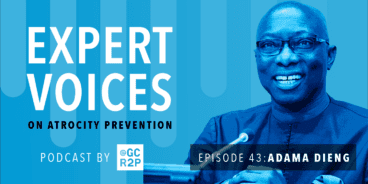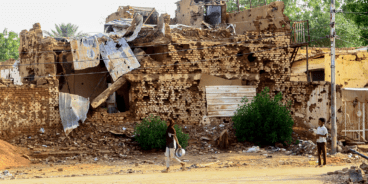Atrocity Alert No. 125: Venezuela, Cameroon and South Sudan
Atrocity Alert is a weekly publication by the Global Centre for the Responsibility to Protect highlighting situations where populations are at risk of, or are enduring, mass atrocity crimes.
Regional pressure grows over crimes against humanity in Venezuela
In an unprecedented step, on 26 September six countries wrote to the Chief Prosecutor of the International Criminal Court (ICC) requesting that her office open a formal investigation into possible crimes against humanity in Venezuela. The six regional states – Argentina, Canada, Chile, Colombia, Paraguay and Peru – are the first countries to have referred a situation to the ICC for crimes that have taken place in another state.
All six countries, along with Venezuela, are parties to the Rome Statute, giving the ICC potential jurisdiction over war crimes, genocide or crimes against humanity committed on their territory. The ICC announced the opening of a preliminary examination of the situation in Venezuela last February.
In the midst of intense economic crisis and ongoing political turmoil, the Venezuelan government continues to systematically perpetrate human rights violations and abuses. In May a 450-page report by a panel of independent international experts commissioned by the Organization of American States found that the Venezuelan government has committed potential crimes against humanity since 2014. The report documents numerous human rights abuses, including extrajudicial killings, arbitrary detention, sexual violence, and torture. Responsibility is attributed to state security forces and auxiliary militias, including so-called “colectivos.”
Canada’s Foreign Minister, Chrystia Freeland, told a news conference at the UN General Assembly last week that there “is a large and growing body of evidence that the Maduro regime has committed gross human rights violations against its own people.” Referring to the joint letter to the ICC, Argentina’s Foreign Minister, Jorge Faurie, said that the alleged violations in Venezuela, if proven, “would clearly constitute crimes against humanity, calling for our action.”
Meanwhile, on 27 September the UN Human Rights Council (HRC) adopted a resolution by a vote of 23 to 7 with 17 abstentions requesting that the High Commissioner for Human Rights, Michelle Bachelet, formally report on the situation in Venezuela. This is the first time the HRC has passed a resolution on the crisis in Venezuela.
An estimated 2.3 million Venezuelans have fled the country since 2015, with the vast majority seeking sanctuary in neighboring states. Both the referral letter to the ICC and the HRC resolution demonstrate the growing alarm within the region regarding the humanitarian and human rights catastrophe that is slowly unfolding in Venezuela. In response, states should not only push for accountability under international law, but also implement targeted sanctions on those with command responsibility for potential crimes against humanity in Venezuela.
Threat of atrocities grows in Cameroon as election looms
On Sunday, 7 October, Cameroon will hold presidential elections. The elections will take place amidst ongoing military operations in the north of the country against the armed extremist group Boko Haram, as well as a deadly deterioration in the ongoing conflict between Cameroonian security forces and armed separatists within the country’s Anglophone regions. During his first election rally in the city of Maroua, in the Far North Region, President Paul Biya – who has been in power for over 35 years – declared victory over Boko Haram and emphasized the need for a “firm hand and dialogue” to address the Anglophone crisis.
In late 2016 a widespread protest movement developed in the South-West and North-West regions of the country in response to the alleged marginalization of English-speaking Cameroonians by the Francophone-dominated government. The protests were met with violent repression and in response armed separatists proclaimed the independent state of “Ambazonia” on 1 October 2017. A curfew and other restrictions on movement and assembly were put place in Anglophone-majority towns ahead of the anniversary of the declaration on Monday. Armed separatists, meanwhile, have vowed to disrupt the upcoming presidential election throughout the South-West and North-West regions.
Since the Anglophone crisis began in 2016, Cameroonian security forces have used disproportionate and deadly force against demonstrators, targeted civilians on the basis of their cultural identity and burned down a number of Anglophone villages. Meanwhile armed separatists have attacked schools and carried out kidnappings of state officials. Since January more than 400 civilians have been killed, although the actual figure could be much higher. Government forces have been responsible for the majority of deaths, with the torture, abduction and extrajudicial killing of civilians possibly amounting to crimes against humanity.
With the presidential election just days away, all parties must work to deescalate tensions. The African Union and UN Security Council should impress upon the government the need for the military to strictly adhere to international humanitarian and human rights law. They should also call upon Cameroon to provide immediate access to UN bodies to investigate all alleged human rights violations committed in the Anglophone regions. The government must uphold its responsibility to protect all populations in Cameroon, regardless of their language group or cultural identity.
New report estimates 382,000 deaths during South Sudan civil war
In a report published last week and widely covered in the international media, the London School of Hygiene and Tropical Medicine (LSHTM) estimates that nearly 400,000 people have died during the civil war in South Sudan. Research conducted by the LSHTM determined that the deaths of an estimated 382,900 South Sudanese were directly attributable to the crisis in the country, including 190,000 people who were killed between December 2013 and April 2018. Deaths were also attributed to limited humanitarian aid and access, disease and other factors related to the civil war.
In March 2016 the UN estimated that at least 50,000 people had been killed during the civil war, but the actual figure was considered to be much higher, with the collection of accurate data compromised by a lack of access and inconsistent reporting. Klem Ryan, the former Coordinator of the UN Panel of Experts on South Sudan, said that the LSHTM death toll “is much more realistic than the 50,000 which has been used for so long.”
On 12 September President Salva Kiir and opposition leader Riek Machar signed a Revitalized Agreement on the Resolution of the Conflict in South Sudan (R-ARCSS). On 23 September President Kiir reiterated that his government is committed to implementing the R-ARCSS and that he is ready to work with Machar. During his address to the UN General Assembly on 28 September, First Vice President Taban Deng Gai called upon the international community, “including those who are skeptical, to give peace a chance.”
That same day, the Joint Monitoring and Evaluation Commission noted that the government of South Sudan had already missed important deadlines regarding the implementation of the R-ARCSS, including ratification of the Agreement by the Transitional National Legislature and the release of all prisoners of war and political detainees.
The full and timely implementation of the R-ARCSS is the only way to end South Sudan’s recurring armed conflict and truly “give peace a chance.” The UN Security Council, African Union and regional stakeholders – including the Intergovernmental Authority on Development – should ensure that all those who attempt to undermine or delay the implementation of the R-ARCSS, as well as those responsible for widespread atrocities committed during the civil war, are held accountable for their actions.
Read Next
Related Publications

Expert Voices on Atrocity Prevention Episode 43: Adama Dieng

Atrocity Alert No. 434: Sudan, Ethiopia and the UN Human Rights Council
